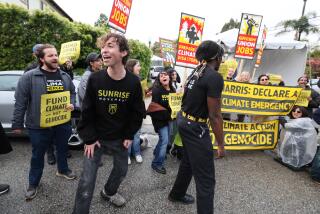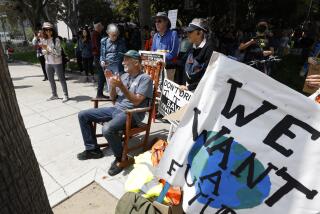SOUTHERN CALIFORNIA AND THE PERSIAN GULF CRISIS : Voices of Dissent Begin Own Mobilization
- Share via
The last time American soldiers were involved in a lengthy armed conflict, Bill Smith waged a solitary campaign to persuade Los Angeles lawyers to defend conscientious objectors to the war in Vietnam.
It took three years before he could even find enough attorneys willing to form an anti-war legal committee.
On Thursday, Smith again joined the lonely ranks of American war dissenters, this time to voice opposition to U.S. intervention in the Persian Gulf and to form a new committee to counsel soldiers reluctant to participate in the Middle East mobilization that threatens to result in war with Iraqi forces.
Like the start of the anti-war movement 25 years ago, the voices of dissent are starting out faintly--at least compared to recent national polls suggesting strong popular support for the decision to send troops to the gulf.
Smith, a rumpled lawyer who counseled dozens of conscientious objectors during the Vietnam War, was among a small group of the liberal Americans for Democratic Action who gathered in a spare West Los Angeles office to counter what they described as the Bush Administration’s “headlong rush into a disastrous war in the Middle East.”
For Smith and his fellow activists, the rhetoric was vintage Vietnam, but with latter-day urgency. This time they want to form an organized, outspoken opposition to the military buildup before events overtake them.
Already, Smith said, he has begun counseling 20 reservists and National Guard members who sought his help to avoid military service in the gulf.
“I suspect we’re ahead of the game,” Smith said. “Vietnam taught us to speak out fast to avoid the quagmire ahead.”
But except for a stack of newly mimeographed press releases near the office door, there were no trappings of the dissenters’ latest cause as they clustered in their 3rd Street office.
Mounds of handbills lay piled on an office partition, advertising radical poetry readings and rallies against the war in El Salvador and strife in Nicaragua--old business--instead of the looming new crisis in the gulf.
A yellow sign--”May we have your old glasses?”--urged visitors to donate their eyeglasses to Nicaragua. Five dusty spectacles and a blue balloon were crammed into a wicker basket.
Bill O’Reilly, 72, a genial ADA supporter and former business executive, noted the difficulty in staking out an unpopular political position these days.
“You feel lonely doing this,” he said. “You feel like you’re sticking your neck out a little bit. But we have to start somewhere.”
But O’Reilly added that much of the early opposition against the Persian Gulf buildup that he has seen is emerging in the form of informal political discussions among friends and acquaintances.
“There are a lot more people raising questions than you might think,” O’Reilly said, “especially conservatives who are worried about the impracticality of what we’re doing.”
Responding to similar reports that much of the early criticism of the mobilization has come from isolationist conservatives, Marvin Schacter, a vice president of the local ADA chapter, insisted that the activists’ thunder has not been stolen.
“We support involvement in the Mideast, but with the United Nations taking the lead,” Schacter said. “They are isolationists who want no involvement at all.”
Seeming almost eager to take on the government again, Bill Smith appears willing to accept help from any and all dissenters--regardless of their political stripes.
“The population is much less hawkish now than they were during Vietnam,” he said. “We’ve got veterans’ groups questioning the wisdom of the government’s actions, college students. . . . I tell you, compared to the last time we’re getting off on the right foot.”
More to Read
Get the L.A. Times Politics newsletter
Deeply reported insights into legislation, politics and policy from Sacramento, Washington and beyond. In your inbox twice per week.
You may occasionally receive promotional content from the Los Angeles Times.










